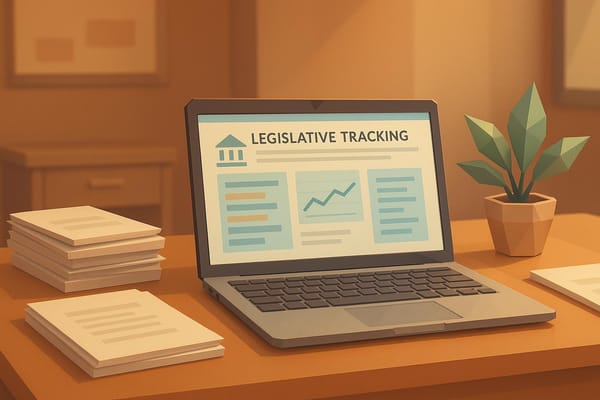SB14: Streamlining Alcohol Vendor Training Online

The landscape of alcohol sales is constantly evolving, and with it, the need for effective and accessible training for vendor employees. Senate Bill 14 (SB14), recently introduced, addresses this by focusing on enhancing the Responsible Vendor Program through the adoption of online training and testing. This bill is not just about convenience; it's about ensuring consistent training standards across the state and making compliance more straightforward for businesses. By setting clear guidelines and timelines, SB14 aims to modernize the training process while maintaining the integrity of responsible alcohol sales. We will break down the key elements of this bill, from online course implementation and a specified passing grade, to the crucial deadlines for the Alcoholic Beverage Control Board and the consequences of inaction. Ultimately, SB14 seeks to make sure vendors are well-prepared to prevent underage alcohol sales and handle intoxicated customers, fostering a safer environment.
Online Training Mandate
SB14 directly tackles the need for modernizing vendor training by mandating that the Alcoholic Beverage Control Board (ABC Board) establish rules for online training and testing. This isn't simply about allowing online options, but about recognizing the need for a standardized online system as a valid option. The bill specifically states, "Responsible vendor training or testing may be conducted online by computer, in a classroom, or by live trainers." This provision acknowledges the flexibility needed by vendors, while ensuring the core curriculum remains the same. What is particularly important is the fact that the bill specifies that "Any online training must include employee testing to pass," demonstrating that the online format won't be a way around necessary evaluations. This emphasis on testing ensures that online programs aren't just a formality but are instead a substantive learning experience.
The bill doesn't just acknowledge online training; it shapes its implementation. SB14 explicitly states that an online test does not need an in-person proctor, demonstrating a balance between practicality and efficacy. This approach recognizes that forcing in-person testing can be a needless burden, and so this flexibility helps streamline the process for vendors. This approach allows businesses to easily integrate training into their processes. SB14 emphasizes the requirement that vendors also "maintain employment records of the training of its employees required by this section...in a digital format," further encouraging and recognizing digital accessibility. These records should be available within 48 hours upon the Board's request, ensuring that records remain accessible to governing bodies while reducing the need for physical storage, and further promotes ease for vendors. These changes are designed to be practical and forward-looking.
Setting a Passing Standard
One important provision within SB14 is the formal establishment of a passing grade for the employee training course. It states that an employee must "achieve a passing grade of 70 percent or higher on a test of the course subjects within 30 days of commencing employment." This isn't just about completing the training; it's about proving comprehension of the material. This element provides a clear benchmark for competency, ensuring that employees selling alcoholic beverages truly understand the legal requirements and procedures. Prior to this bill, the passing standard was left unclear and subject to interpretation, but this standardized approach sets the bar higher, meaning that businesses must take these training procedures seriously. It's a step towards consistent implementation of responsible sales practices. The bill also stipulates that all trained employees attend additional meetings, or "other schedule of meetings on another periodic basis" determined by the board, which means that training is not a one-time occurrence, but a continuous process of learning and improvement.
This consistent standard means that businesses must invest in training quality. With a clear passing grade established, training modules will need to be designed in ways that ensure employees can reach this level of understanding. This creates a direct incentive for training providers to develop thorough, effective programs. Furthermore, the 30-day window encourages a quick and efficient process of education and evaluation. This element avoids drawn-out processes and helps integrate the training into the workflow of new employees. The 70 percent threshold is a reasonable standard for competency and, as such, it provides a clear measure of an employee's preparedness to serve alcohol responsibly. This aspect of SB14 sets a measurable and achievable goal for vendor training programs, increasing their overall effectiveness.
The ABC Board's Deadline
A critical component of SB14 is the strict deadline it imposes on the ABC Board for adopting the rules for online vendor training and testing. According to the bill, "No later than 120 days from the effective date of this act, the board shall certify rules consistent with the requirements of this act, including rules providing for both the presentation of the course of instruction and testing online by vendors." This deadline is not arbitrary; it demonstrates the bill’s urgency in modernizing the training process. The specificity of the deadline also underscores the intent to ensure the board is held accountable and is not able to delay the implementation. This deadline is a call to action, and demonstrates that the lawmakers do not want further delays or bureaucratic obstacles to implementing these changes.
The bill does not just specify a deadline, but also outlines the consequences for inaction. Specifically, if the board fails to meet the 120-day deadline, it "may no longer operate any liquor store as defined in Section 28-3-1." This strong penalty underscores the bill's emphasis on timely compliance and it provides a compelling reason for the ABC Board to act expeditiously. The clause is designed to make sure the transition to online training is not slowed down by bureaucratic inertia. It provides a direct, measurable consequence to non-compliance, thus ensuring that the board does its part in modernizing the vendor training system. This approach showcases a clear emphasis on efficiency and responsibility, reinforcing the gravity of the changes introduced by SB14.
Additional Provisions
Beyond the main components of the bill, SB14 also includes additional provisions that refine the existing framework of the Responsible Vendor Program. The bill seeks to eliminate redundant language and includes technical revisions to update the existing code to current standards. This helps improve readability and ensures the law is both concise and up-to-date with current linguistic practices. It is meant to make the code clearer and easier to understand. These efforts demonstrate a thorough review of the existing code, ensuring that it is not only functionally effective but also easy to interpret.
SB14 also specifies that training should include methods for identifying and refusing service to underage individuals and for assisting employees in dealing with intoxicated customers. The requirement that vendors also "post signs on the vendor's premises informing customers of the vendor's policy against selling alcoholic beverages to underage customers" helps to promote transparency and shows the vendor's commitment to the law. These provisions go beyond mere compliance and aim to foster a culture of responsibility. This emphasis on addressing underage sales and managing intoxicated patrons underlines the bill's focus on public safety and responsible alcohol service. By making sure the language is direct and to the point, SB14 provides comprehensive direction to vendors, and also to enforcers.
Impact on Businesses
The implications of SB14 for businesses selling alcohol are significant. The move towards online training provides much-needed flexibility, enabling businesses to integrate training with far less disruption. Online training helps businesses avoid scheduling conflicts, reduce travel costs, and train more quickly, and at their own pace. These flexibilities do not come at the expense of quality, given the need for a 70% passing grade and the digital record keeping. This will help to increase efficiency and reduce the cost to businesses. This ease of implementation is crucial for smaller businesses that may not have the resources to organize traditional in-person training sessions.
Furthermore, the threat of the ABC Board losing its authority over retail stores should they fail to implement the rules on time provides a strong incentive for the ABC to act quickly. This also sends a clear message to businesses that compliance is essential. By modernizing the approach to vendor training, SB14 also aims to foster a culture of continuous improvement, promoting regular training meetings, and ensuring that employees are always up-to-date with best practices. The streamlined and modern format of SB14 encourages a more proactive approach, allowing businesses to focus on their core operations, while ensuring responsible service. The clear benchmarks, such as the 70 percent passing grade, also eliminate any ambiguity about whether a business is in compliance.
Looking Ahead
The passage of SB14 marks an important shift towards the modernization of alcohol vendor training in the state. By setting clear standards, mandating online training options, and establishing a strict deadline for the ABC Board, the bill aims to streamline the training process and improve its effectiveness. The bill's emphasis on both accessibility and accountability will benefit both businesses and the communities they serve. The introduction of a passing grade and requirements for further education of vendors makes sure that training is not a one-off procedure but a continuing process of education, ensuring the integrity of the process.
Ultimately, the success of SB14 will rely on the proactive engagement of the ABC Board, and by the cooperation of businesses. If the ABC Board fails to meet its mandated timeline, it risks undermining the goals of the legislation and the integrity of its operations. It's clear that SB14 is aimed at improving the overall quality of alcohol vendor training, promoting responsible sales, and making it easier for businesses to comply with the law. As the bill moves forward, it will be crucial for all stakeholders to work together to make sure its objectives are fully realized, fostering a safer and more responsible environment for everyone involved in the sale of alcoholic beverages.




